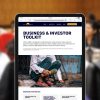Supply chains have
never been this global;
nor this complex.
Transparency and collaboration are needed to protect workers and drive ethical business practices.
The Bali Process Government and Business Forum (GABF) provides a platform for collaboration between government and business leaders to combat modern slavery, specifically forced labour, human trafficking and the worst forms of child labour. It brings together influential business leaders and ministers from 45 Member States and 4 international organisations.


Capital Maharaja Group Group Director Chevaan Daniel, CMG Chairman Sashi Rajamahendran, IOM Head of Protection Unit Minoli Don, CMG General Manager Ravi Gamage at the Sri Lanka Summit.
A government & business partnership
In 2002, the Bali Process on People Smuggling, Trafficking in Persons and Related Transnational Crime was established to improve regional cooperative efforts on these issues. In 2017, the private sector was invited to join this most crucial dialogue to eradicate forced labour from supply chains.

Why business should act
Modern slavery impacts every country and supply chain in the world. With annual profits from modern slavery and human trafficking estimated at US$236 billion, business leaders must take action to ensure profits are not derived from the exploitation of vulnerable workers.
Not only is it critical that businesses uphold their responsibility to respect human rights and maintain their social license to operate, but increasingly as prerequisite to access global markets, many of which are now banning the importation of goods made with forced labour.
Failing to identify and address modern slavery may be linked to other problems in supply chains such as corruption, and it often results in lower productivity and resilience. Modern slavery and related exploitation can result in material financial impacts for a business – it is therefore crucial that companies disclose to investors and other stakeholders how they are identifying and addressing these risks.
Investors are becoming increasingly sophisticated in analysing the appropriateness and effectiveness of a company’s risk and response to modern slavery and integrating it into investment decisions.

Business & Investor Toolkit
Walk Free’s toolkit helps businesses and investors take action to improve human rights standards in their supply chains and combat forced labour, human trafficking and other forms of modern slavery. We have curated these resources into five categories:
- Understanding the problem
- Supply chain due diligence, codes of conduct, corrective action and remedy
- Legal obligations and frameworks
- Modern slavery reporting
- Financial sector tools
H.E. Retno L.P. Marsudi,
Indonesian Minister of Foreign Affairs
“Business and government must find durable solutions to the root causes of human trafficking and forced labour.”

Acknowledge. Act. Advance.
The Government and Business Forum agreed a framework for business and government to combat human trafficking, forced labour, modern slavery and the worst forms of child labour.